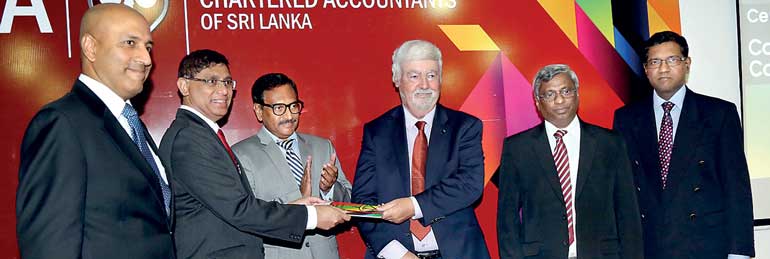Thursday Feb 19, 2026
Thursday Feb 19, 2026
Tuesday, 2 January 2018 00:00 - - {{hitsCtrl.values.hits}}

CA Sri Lanka Outgoing president Lasantha Wickremasinghe handing over a copy of the revised code of Best Practice on Corporate Governance to SEC Chairman Thilak Karunaratne in the presence of CA Sri Lanka president elect Jagath Perera, Corporate Governance Committee Chairman Asite Talwatte and CEO Aruna Alwis

CA Sri Lanka president elect Jagath Perera hands over a copy of the Code to Professor Barry J Cooper, Associate Dean (Regional Engagement) of Deakin University, in the presence of Wickremasinghe, Talwatte, Alwis and Professor Gishan Dissanaike from the University of Cambridge

In continuing to give leadership to corporates in the country to adhere to the best practices of corporate governance, the Institute of Chartered Accountants of Sri Lanka (CA Sri Lanka) recently launched the revised Code of Best Practice on Corporate Governance 2017.
Speaking at the event, outgoing president of CA Sri Lanka Lasantha Wickremasinghe said corporate governance is of paramount importance to a company, both big and small. He also said that good corporate governance can contribute greatly to a country such as Sri Lanka, which is going through a phase of revival.
“CA Sri Lanka is proud to be the pioneer in introducing corporate governance to Sri Lanka. The first Code was issued in December 1997, and was subsequently updated in 2003, 2008, and 2013. But, corporate governance is a dynamic force that keeps evolving, therefore taking into consideration the global changes and the need to adhere to these changes locally, we decided to update the existing Code by accommodating most of the good governance principals,” he said.
Wickremasinghe noted that with Sri Lanka being promoted as a hub in South Asia, and with more investments coming into the country, there is a greater need for organisations to follow the corporate governance code. “When a company and its professionals adhered to good corporate governance it not only contributes towards the long term success of the company, but will ensure greater competitiveness and growth, which will ultimately reflect on the country and its economy,” Wickremasinghe added.
Securities and Exchange Commission of Sri Lanka Chairman Thilak Karunaratne said that corporate governance in Sri Lanka had come a long way and the current revision of the code is relevant and timely. He commended CA Sri Lanka for taking the important step to revise the Code to stay abreast of the global corporate governance standards while emphasising that the revised Code also helped foster ethical business behaviour and greater accountability and transparency.
He said corporate governance is essentially thought of as the way in which enterprises are directed and controlled. “Studies have shown that good corporate governance not only enhances the image and reputation of a company, but produces direct economic benefits by making it more profitable and competitive. This in turn creates more value for all stakeholders,” Karunaratne said.
Corporate Governance Committee Chairman Asite Talwatte said the Code of 2017 builds on the previous Codes to strengthen best practice in governance in the context of global developments relevant to Sri Lanka, emerging contemporary matters of governance and challenges with greater importance to the Sri Lankan capital market.
“Securities regulations, accounting standards, audits and assurance standards, company law and other industry specific laws have the force of legislation. Governance on the other hand is a voluntary code by which corporates demonstrate their commitment to strategy and execution in a sustainable manner complying with these laws and regulations, with the right set of skills, knowledge and expertise on its boards, thereby delivering results ethically, and recognising all significant stakeholders interests,” Talwatte added.
Keynote speaker Professor Barry J Cooper, Associate Dean (Regional Engagement) of Deakin University spoke on ‘Challenges and recent developments in corporate governance’ while Guest Speaker Professor Gishan Dissanaike, Adam Smith Professor of Corporate Governance, of the University of Cambridge spoke on ‘Comply or explain vs. mandatory approaches to corporate governance’.